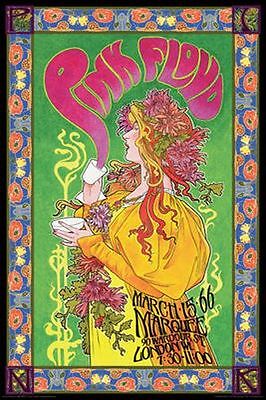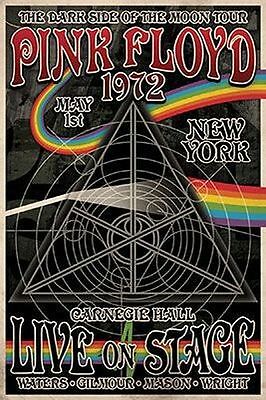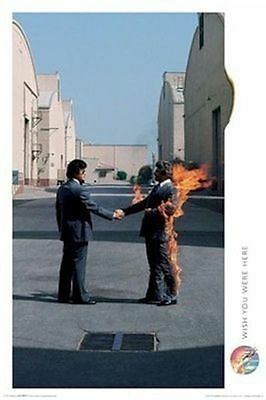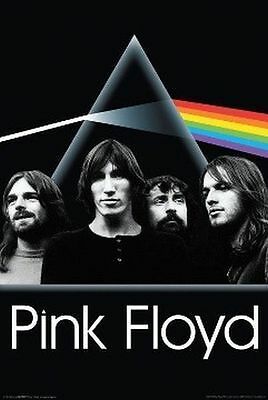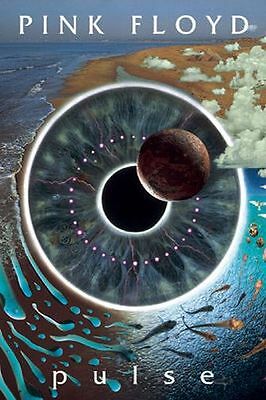-40%
PINK FLOYD WISH YOU WERE HERE ALBUM COVER 24x36 POSTER CLASSIC ROCK MUSIC ICON!!
$ 6.85
- Description
- Size Guide
Description
•One 24x36 individual poster
•
Brand new and never hung
•
Shipped in a secure cardboard tube
•
We accept returns, 100% Satisfaction Guaranteed :-)
Wish You Were Here is the ninth studio album by the English rock band Pink Floyd, released on 12 September 1975 through Harvest Records and Columbia Records, their first release for the latter. Based on material Pink Floyd composed while performing in Europe, Wish You Were Here was recorded over numerous sessions throughout 1975 at Abbey Road Studios in London.
The album's themes include criticism of the music business, alienation, and a tribute to founding member Syd Barrett, who left seven years earlier with deteriorating mental health. Like their previous record, The Dark Side of the Moon (1973), Pink Floyd used studio effects and synthesisers. Guest singers included Roy Harper, who provided the lead vocals on "Have a Cigar", and Venetta Fields, who added backing vocals to "Shine On You Crazy Diamond". To promote the album, the band released the double A-side single "Have a Cigar" / "Welcome to the Machine".
Wish You Were Here received mixed reviews from critics on its release, who found its music uninspiring and inferior to their previous work. It has retrospectively received critical acclaim, hailed as one of the greatest albums of all time, and was cited by keyboardist Richard Wright and guitarist David Gilmour as their favourite Pink Floyd album. It reached number one in the US and UK, and Harvest's parent company, EMI, was unable to keep up with the demand. Since then, the record has sold over 20 million copies.
Pink Floyd were an English rock band formed in London in 1965. Gaining an early following as one of the first British psychedelic groups, they were distinguished for their extended compositions, sonic experimentation, philosophical lyrics and elaborate live shows, and became a leading band of the progressive rock genre.
Pink Floyd were founded by students Syd Barrett (guitar, lead vocals), Nick Mason (drums), Roger Waters (bass guitar, vocals), and Richard Wright (keyboards, vocals). Under Barrett's leadership, they released two charting singles and a successful debut album, The Piper at the Gates of Dawn (1967). Guitarist and vocalist David Gilmour joined in December 1967; Barrett left in April 1968 due to deteriorating mental health. Waters became the primary lyricist and thematic leader, devising the concepts behind the band's peak of critical and commercial success with the albums The Dark Side of the Moon (1973), Wish You Were Here (1975), Animals (1977), and The Wall (1979). The Waters-written musical film based on The Wall album, Pink Floyd – The Wall (1982), won two BAFTA Awards.
Following personal tensions, Wright left Pink Floyd in 1979, followed by Waters in 1985. Gilmour and Mason continued as Pink Floyd, rejoined later by Wright. The band produced two more albums—A Momentary Lapse of Reason (1987) and The Division Bell (1994)—and toured both albums before entering a long period of inactivity. In 2005, all but Barrett reunited for a one-off performance at the global awareness event Live 8. Barrett died in 2006, and Wright in 2008. The last Pink Floyd studio album, The Endless River (2014), was based on unreleased material from the Division Bell recording sessions.
By 2013, Pink Floyd had sold more than 250 million records worldwide, making them one of the best-selling music artists of all time. The Dark Side of the Moon and The Wall are among the best-selling albums of all time, and both have been inducted into the Grammy Hall of Fame.[1] Four of the band's albums topped US or UK record charts, and hit singles produced include "See Emily Play" (1967), "Money" (1973), the three-part composition "Another Brick in the Wall" (1979), "Not Now John" (1983), "On the Turning Away" (1987) and "High Hopes" (1994). The band also composed several film scores. They were inducted into the US Rock and Roll Hall of Fame in 1996 and the UK Music Hall of Fame in 2005. In 2008, King Carl XVI Gustaf of Sweden presented Pink Floyd with the Polar Music Prize for their contribution to modern music.
David Robert Jones (8 January 1947 – 10 January 2016), known professionally as David Bowie (/ˈboʊi/, UK also /ˈbəʊi/ BOH-ee),[1] was an English singer-songwriter and actor. He was a leading figure in the music industry and is regarded as one of the most influential musicians of the 20th century. He was acclaimed by critics and musicians, particularly for his innovative work during the 1970s. His career was marked by reinvention and visual presentation, with his music and stagecraft having a significant impact on popular music. During his lifetime, his record sales, estimated at over 100 million records worldwide, made him one of the best-selling music artists of all time. In the UK, he was awarded ten platinum album certifications, eleven gold and eight silver, and released eleven number-one albums. In the US, he received five platinum and nine gold certifications. He was inducted into the Rock and Roll Hall of Fame in 1996. Rolling Stone placed him among its list of the 100 Greatest Artists of All Time and named him the "Greatest Rock Star Ever" following his death in 2016.
Born in Brixton, South London, Bowie developed an interest in music as a child. He studied art, music and design before embarking on a professional career as a musician in 1963. "Space Oddity", released in 1969, was his first top-five entry on the UK Singles Chart. After a period of experimentation, he re-emerged in 1972 during the glam rock era with his flamboyant and androgynous alter ego Ziggy Stardust. The character was spearheaded by the success of Bowie's single "Starman" and album The Rise and Fall of Ziggy Stardust and the Spiders from Mars, which won him widespread popularity. In 1975, Bowie's style shifted towards a sound he characterised as "plastic soul", initially alienating many of his UK fans but garnering him his first major US crossover success with the number-one single "Fame" and the album Young Americans. In 1976, Bowie starred in the cult film The Man Who Fell to Earth, directed by Nicolas Roeg, and released Station to Station. In 1977, he further confounded expectations with the electronic-inflected album Low, the first of three collaborations with Brian Eno that came to be known as the "Berlin Trilogy". "Heroes" (1977) and Lodger (1979) followed; each album reached the UK top five and received lasting critical praise.
After uneven commercial success in the late 1970s, Bowie had UK number ones with the 1980 single "Ashes to Ashes", its album Scary Monsters (and Super Creeps), and "Under Pressure", a 1981 collaboration with Queen. He reached his commercial peak in 1983 with Let's Dance; its title track topped both UK and US charts. Throughout the 1990s and 2000s, Bowie continued to experiment with musical styles, including industrial and jungle. He also continued acting; his roles included Major Jack Celliers in Merry Christmas, Mr. Lawrence (1983), Jareth the Goblin King in Labyrinth (1986), Pontius Pilate in The Last Temptation of Christ (1988), and Nikola Tesla in The Prestige (2006), among other film and television appearances and cameos. He stopped touring after 2004 and his last live performance was at a charity event in 2006. In 2013, Bowie returned from a decade-long recording hiatus with The Next Day. He remained musically active until his death of liver cancer at his home in New York City, two days after his 69th birthday and the release of his final album, Blackstar (2016). Blackstar won British Album of the Year at the 2017 Brit Awards and five Grammy Awards at the 2017 Grammy Awards.

